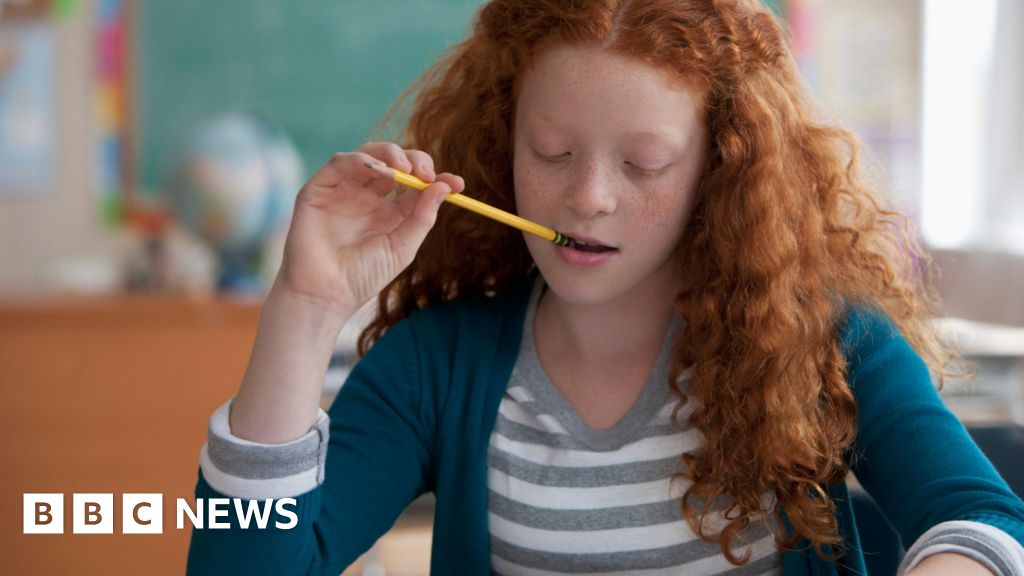Business
Transfer test: Children from Belfast low income families to be given free tuition

Sebastian GriffithsBBC News NI
 PA Media
PA MediaSome children, from low-income families in Belfast, are to get free transfer test tuition from a new centre aiming to “level the playing field”.
The new Foodstock Education and Empowerment Centre, aims to improve outcomes for children from disadvantaged backgrounds across the city.
It will provide free, high quality tuition and wellbeing support for primary pupils in years six and seven.
One of those backing the centre is former world champion boxer Carl Frampton who spoke at the centre’s launch.
 PA Media
PA Media“My own child is going through the test and I know how stressful it can be,” Frampton told BBC News NI.
“There are kids that have ability but just need a bit of help. It’s stressful for me and I am lucky to be comfortable financially but there are others struggling so much – this is just about giving kids who are able opportunities.”
Frampton also praised the cross-community aspect of the centre and the importance of the facility being situated in the city centre.
“You know what this place is like – it can be very tribal, and people maybe don’t want to go here or there or whatever,” he said.
“But to have a central location willing to help anybody that needs their help, I just think it’s an amazing thing.”
‘Removing barriers when it comes to education’

The new centre will provide weekly small group tuition in English, Maths and reasoning to prepare children for the Schools’ Entrance Assessment Group (SEAG) tests.
More than 60 post-primary schools across Northern Ireland use the test to decide which pupils to admit into year eight.
A paper by Queen’s University in 2022 claimed that academic selection perpetuated division in wider society in Northern Ireland and “disadvantages the already most disadvantaged”.
Foodstock founder Paul Doherty said it will “tackle the longer impacts of poverty through education” and will “empower people to better their lives”.
“A lot of people say because of financial difficulties they cannot afford additional tuition and they are pulling their child out of the transfer test,” he said.
“We talk about removing barriers when it comes to hunger through breakfast programmes – this is removing other barriers when it comes to education”.

One to one support will also be provided for children facing particular challenges.
Eligibility will be for pupils that need it most such as those from areas of high deprivation or low income families.
Foodstock said private tuition doubled the likelihood of attending a grammar school, but disadvantaged children were less able to finance it.
Its tuition programme will help “level the playing field for children across Belfast”, it said.
Foodstock’s director of strategy Ciaran Toman said he believed the centre will “reach people right across the city regardless of community” with the overall aim to “benefit as many children as possible”.
He added that it could help give “equal opportunity to those who are less fortunate and that the centre can plug that gap for disadvantaged children”.

Business
Investors suffer a big blow, Bitcoin price suddenly drops – SUCH TV

After the drop in gold price, Bitcoin price also fell.
Bitcoin fell below $77,000 in the global market, Bitcoin price fell by more than 13% in a week.
Bitcoin’s highest price in 6 months fell below $126,000, Bitcoin price has dropped by more than $49,000.
Business
Post-Budget Session: Bulls Push Sensex Up By Over 900 Points, Nifty Reclaims 25,000

Last Updated:
The BSE Sensex is trading higher by 371 points, or 0.47%, at 81,090.24, while the NSE Nifty rises by 70 points to trade above 24,850 at 24,889.25.

Stock Market Today.
Market Updates Today: A day after the market crash following the Budget’s provision to hike Securities Transaction Tax (STT), the domestic equity market on Monday saw heightened volatility. After opening nearly flat, the NSE Nifty rose to the day’s high, then touched the day’s low before sharply recovering to trade at the day’s high of 25,093.
As of 3:16 pm, the BSE Sensex surged by 932 points, or up 1.13%, to 81,641.87 in the afternoon trade and the NSE Nifty rose by 267 points, or up 1.07%, to trade above 25,000 at 25,093.27. After opening nearly flat, the NSE Nifty rose to the day’s high, then touched the day’s low before sharply recovering to trade at the day’s high of 25,093.27.
Among the 30 Sensex shares, 25 stocks were trading in the green. Among the top gainers were PowerGrid, Adani Ports, BEL, Reliance, Mahindra & Mahindra, Larsen & Toubro, and IndiGo, rising by up to 7.91%. The laggards were Axis Bank, Infosys, Titan, TCS, and Trent, falling by up to 1.97%.
After opening nearly flat, at around 9:30 am, the BSE Sensex jumped by 350 points to 81,112.03 in the opening trade, while the NSE Nifty rose 91 points to trade above the 24,900 level at 24,910.85. However, the benchmarks gave up all gains and declined to day’s low amid heavy volatility.
Aakash Shah, technical research analyst at Choice Equity Broking Private Ltd, said, “Near-term sentiment remains cautious despite some support from domestic technical indicators. The broader market direction will largely be influenced by global equity cues, crude oil price movements, and institutional fund flows.”
On Sunday, the Nifty saw an aggressive sell-off after the Budget 2026 announcement to hike STT, plunging nearly 870 points from 25,440 to an intraday low of 24,571, before staging a partial recovery to close at 24,825.
“A strong bearish candle was formed, with the index closing decisively below the 200-day EMA, indicating a deterioration in trend strength. Immediate resistance is placed at 24,950–25,000, while key support lies in the 24,650-24,700 zone. The RSI slipped to 31, reflecting oversold conditions, while India VIX surged 10.73% to 15.09, highlighting elevated market volatility,” Shah said.
On Sunday, February 1, foreign institutional investors (FIIs) sold equities worth Rs 588 crore, while domestic institutional investors (DIIs) also remained net sellers, offloading shares worth Rs 682 crore, adding to the pressure on the market.
V K Vijayakumar, chief investment strategist at Geojit Investments Ltd, said, “Yesterday’s market selloff resulting in 495 point crash in Nifty was a knee-jerk reaction to the sharp increase in STT on F&O trades. This was not a revenue-raising measure, but a decision to discourage retail traders from complex F&O trading, in which 92% of them were losing money. This decision is in the interest of retail investors. But this decision impacted the market sentiments, which were already impacted by the decision to make no changes in the LTCGs tax, which a section of the market was expecting rather unrealistically.”
It is important to understand that the Budget is a growth-oriented Budget with fiscal prudence. The 10% nominal GDP growth projected in the Budget is achievable and has the potential to deliver around 15% earnings growth in FY27. The market will soon start discounting this positive. But it is possible that FIIs may continue to sell impacting the market. Retail investors should keep their cool and remain invested and continue to invest systematically. A significant upturn in the market may take time; perhaps a retreat from AI trade globally. We don’t know when this will happen. But we know that an earnings rebound is imminent in response to this growth oriented Budget. That is a clear positive, he added.
February 02, 2026, 09:34 IST
Read More
Business
Gold prices fall sharply locally and internationally – SUCH TV

Gold prices have fallen significantly in both local and international markets, with 10 grams now priced at Rs18,433 and a tola at Rs21,500.
The price per tola fell below Rs22,000, reaching Rs21,500, while 10 grams dropped to Rs18,433.
Internationally, gold also saw a decline, with prices falling by 215 dollars to 4,676 dollars per ounce.
-

 Sports6 days ago
Sports6 days agoPSL 11: Local players’ category renewals unveiled ahead of auction
-

 Entertainment6 days ago
Entertainment6 days agoClaire Danes reveals how she reacted to pregnancy at 44
-

 Business6 days ago
Business6 days agoBanking services disrupted as bank employees go on nationwide strike demanding five-day work week
-

 Tech1 week ago
Tech1 week agoICE Asks Companies About ‘Ad Tech and Big Data’ Tools It Could Use in Investigations
-

 Fashion1 week ago
Fashion1 week agoSpain’s apparel imports up 7.10% in Jan-Oct as sourcing realigns
-

 Sports6 days ago
Sports6 days agoCollege football’s top 100 games of the 2025 season
-

 Politics1 week ago
Politics1 week agoFresh protests after man shot dead in Minneapolis operation
-

 Politics6 days ago
Politics6 days agoTrump vows to ‘de-escalate’ after Minneapolis shootings







